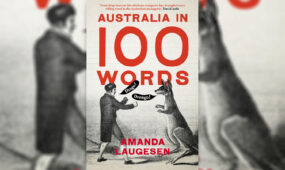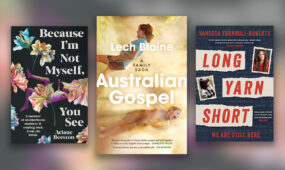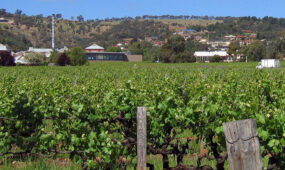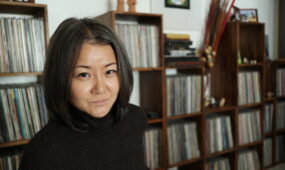Book extract: Hannah Kent's The Good People
Books & Poetry
Adelaide-born author Hannah Kent’s second novel transports readers to 19th-century rural Ireland, where superstition, ritual and “fairy lore” dominate every aspect of life – and death.

Like Kent’s previous novel, Burial Rites (about a woman sentenced to execution in Iceland in 1829 for the murder of two men), The Good People is inspired by an account of a real-life crime.
At the centre of the novel is Nóra Leahy, who, having lost both her daughter and her husband, is left alone to care for her four-year-old grandson Micheál, who cannot walk or talk. Her ill-fortune is grist for the local gossip-mongers, prompting the desperate widow to seek help from and old “handywoman” known to consort with the “Good People” (fairies).
The following extract, published ahead of a book launch event in Adelaide next week, is from chapter one, as neighbours gather at Nóra’s home following the death of her husband Martin on their farm.
***
By nightfall the cabin was filled with neighbours who had heard that Martin had died by the crossroads next to the blacksmith’s, falling to the ground on the strike of hammer on anvil as though the ringing of iron had killed him. They gathered around the hearth, taking consolation from their pipes and murmuring condolences to Nóra. Outside, the rain blew against the thatch.
Confronted with a sudden crowd, Nóra concentrated on collecting preparations for the wake with Áine. There was no time to weep while they had poitín, clay pipes, tobacco and chairs to find. Nóra knew that death made people long to smoke and drink and eat, as though by tending to their lungs and stomachs they were assuring themselves of their own good health, of the certainty of their continued existence.
When she felt the weight of her grief threaten to press her to the floor, Nóra retreated to the cabin walls and pushed her palms against the cool limewash to steady herself. She took deep breaths and stared at the people in the room. Most of them were from the valley, tied to one another by blood and labour and a shared understanding of the traditions stamped into the soil by those who had come before them. They were quiet, close folk, those who lived on the shadowed side of Crohane, in the fertile crucible formed by the rising rock and hill of Foiladuane, Derreenacullig and Clonkeen. And they were familiar with death. In her small house Nóra could see that her neighbours were making room for sorrow in the way they knew to be best. They piled turf on the fire and built the flames high, filled the air with smoke, and told each other stories. There would be a time to cry, but it was not yet.
Thunder rolled outside, and the guests shivered and drew closer to the fire. As Nóra moved around the room, setting out drinking water, she heard the people whisper stories of divination. The men commented on the weather and the movements of jacksnipes and magpies, seeing in them signs of Martin’s death. Much was made of his collapse at the crossroads where they buried suicides. Some spoke of the sudden change in the sky that afternoon, of the great blackening of clouds in the west and how they had surely heralded Martin’s passing. Of the storm that was closing in upon them.
Unaware that Nóra was listening, Peter O’Connor was telling the men that, just before he had seen Martin clutch his heart, he had noticed four magpies sitting together in a field.
‘There I was, walking the lane, and did those birds move? They did not. They let me pass within arm’s reach of them and not once did they startle. “That’s mighty strange,” I thought to myself, and – I tell you, lads – a shiver went through me for it seemed they stood in conference. “Someone has died,” I thought. Then sure, I make my way down the boreen until I reached the crossroads and, soon enough, there is Martin Leahy, lying with the sky in his eyes and the clouds darkening beyond the mountains.’
There was a slap of thunder and they jumped.
‘So, ’twas you that found him then, lying there?’ asked Nóra’s nephew, Daniel, drawing on his pipe.
‘’Twas. And a sorrow ’twas to me too. I saw that great man topple like a tree. He had not yet the cold upon him, God rest his soul.’
Peter’s voice softened to a hush. ‘And that’s not all of it. When John and I were bringing the body here, dragging him up the slope from the crossroads – and you know the heft of Martin, ’twas slow going – well, we stopped a while to catch our breath, and we looked down the valley, out towards the woods, and there we saw lights.’
There was a murmur of intrigue.
‘That’s right. Lights. Coming from where the fairies do be, down by the Piper’s Grave,’ Peter continued. ‘Now, I might not have the full of my eyes, but I swear I saw a glowing by that whitethorn. You mark my words, there’ll be another death in this family before long.’ His voice dropped to a whisper. ‘First the daughter passes, and now the husband. I tell you, death likes three in company. And if the Good People have a hand in it . . . well.’

Get InReview in your inbox – free each Saturday. Local arts and culture – covered.
Thanks for signing up to the InReview newsletter.
Extracted from The Good People, by Hannah Kent, published by Picador Australia.

Hannah Kent will discuss The Good People in conversation with Rebekah Clarkson at a public launch event hosted by Matilda Bookshop at Elder Hall on October 12. Details here.
Support local arts journalism
Your support will help us continue the important work of InReview in publishing free professional journalism that celebrates, interrogates and amplifies arts and culture in South Australia.
Donate Here





Comments
Show comments Hide comments